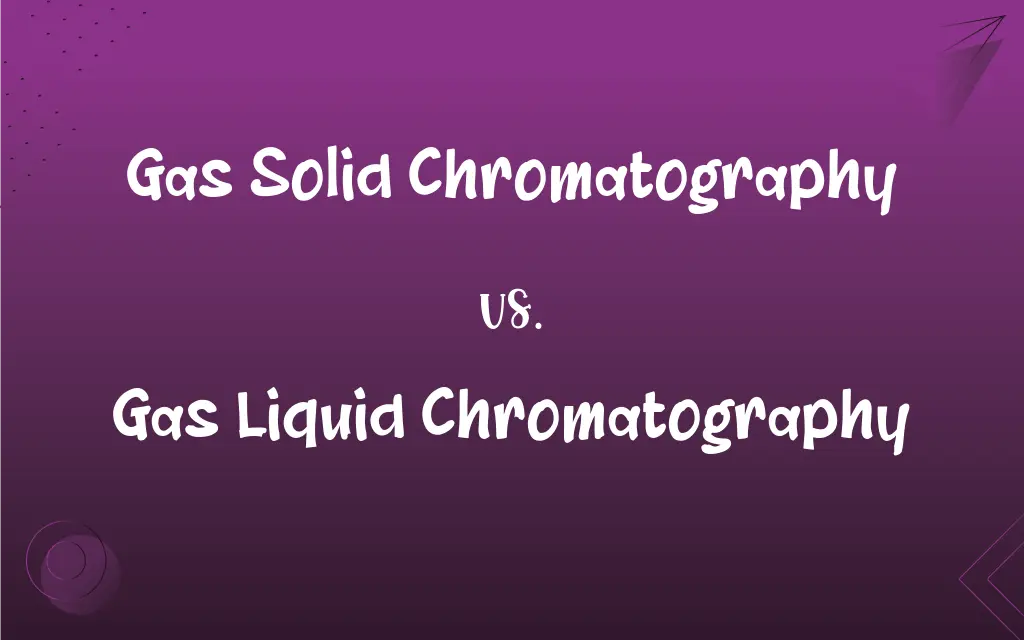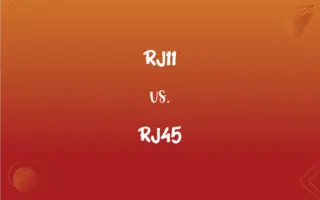Gas Solid Chromatography vs. Gas Liquid Chromatography: What's the Difference?
Edited by Aimie Carlson || By Harlon Moss || Published on January 3, 2024
Gas solid chromatography separates compounds using a solid stationary phase, while gas liquid chromatography uses a liquid stationary phase.

Key Differences
Gas Solid Chromatography (GSC) involves a stationary phase that is solid, typically a granular material. Gas Liquid Chromatography (GLC), however, uses a liquid stationary phase coated on a solid support.
In GSC, the separation of components is based on their adsorption to the solid surface. In GLC, the separation occurs due to the differing solubilities of compounds in the liquid phase.
Gas Solid Chromatography is often used for gases or volatile compounds that do not interact chemically with the solid phase. Gas Liquid Chromatography is more versatile and can be used for a wider range of compounds, including those that are less volatile.
The efficiency of separation in GSC can be limited by the amount of material that can be adsorbed on the solid phase. GLC often provides better separation efficiency and resolution due to the interaction with the liquid phase.
GSC is more suitable for analyzing permanent gases and light hydrocarbons. GLC is commonly used in the pharmaceutical, environmental, and chemical industries for complex mixture analysis.
ADVERTISEMENT
Comparison Chart
Stationary Phase
Solid
Liquid coated on a solid support
Separation Mechanism
Adsorption to the solid surface
Solubility in the liquid phase
Suitable Compounds
Permanent gases, light hydrocarbons
Wide range, including less volatile compounds
Separation Efficiency
Limited by adsorption capacity
Higher, due to interaction with liquid
Common Applications
Analyzing gases and simple mixtures
Complex mixture analysis in various industries
ADVERTISEMENT
Gas Solid Chromatography and Gas Liquid Chromatography Definitions
Gas Solid Chromatography
GSC is less versatile than GLC but excellent for certain specific applications.
GSC is commonly used in petrochemical laboratories for hydrocarbon analysis.
Gas Liquid Chromatography
GLC is suitable for a wide range of compounds, including less volatile ones.
Pharmaceutical compounds were analyzed using gas liquid chromatography.
Gas Solid Chromatography
Gas solid chromatography is a type of chromatography where the mobile phase is a gas.
The analysis of industrial emissions often employs GSC.
Gas Liquid Chromatography
Gas liquid chromatography offers high separation efficiency and resolution.
GLC provided detailed analysis of complex environmental samples.
Gas Solid Chromatography
In GSC, separation efficiency depends on the adsorption capacity of the solid phase.
GSC effectively separated different noble gases in a mixture.
Gas Liquid Chromatography
In GLC, separation is based on the solubility of compounds in the liquid phase.
Fatty acids in food samples were separated using GLC.
Gas Solid Chromatography
Gas solid chromatography separates compounds based on their adsorption to a solid stationary phase.
GSC is used to analyze the composition of air samples.
Gas Liquid Chromatography
Gas liquid chromatography separates compounds using a liquid stationary phase.
GLC was used to identify different components in essential oils.
Gas Solid Chromatography
GSC is ideal for analyzing gases and volatile compounds.
Methane concentrations were measured using gas solid chromatography.
Gas Liquid Chromatography
GLC is extensively used in the pharmaceutical, environmental, and chemical industries.
Pesticide residues in crops were detected using gas liquid chromatography.
FAQs
What is Gas Liquid Chromatography?
A chromatographic technique using a gas mobile phase and a liquid stationary phase.
How does GSC separate compounds?
Through their differential adsorption to the solid stationary phase.
Where is GLC most commonly used?
In pharmaceutical, environmental, and chemical industries.
What is Gas Solid Chromatography?
A method of separating compounds using a gas as the mobile phase and a solid as the stationary phase.
What types of compounds are best suited for GLC?
Both volatile and less volatile compounds.
What makes GLC efficient in separation?
The interaction of compounds with the liquid phase allows for better resolution.
What is the separation mechanism in GLC?
Compounds are separated based on their solubility in the liquid stationary phase.
What are common applications of GSC?
Analyzing permanent gases and light hydrocarbons.
How do you choose the stationary phase in GSC?
Based on the specific gases or compounds to be analyzed.
Can GSC analyze complex mixtures?
It's less effective for complex mixtures compared to GLC.
What is the mobile phase in both GSC and GLC?
The mobile phase is a gas in both techniques.
What influences the choice of stationary phase in GLC?
The nature of the compounds being analyzed and desired separation.
Is GSC limited in its separation capacity?
Yes, due to the limited adsorption capacity of the solid phase.
What role does temperature play in GLC?
It affects the solubility and movement of compounds in the liquid phase.
Is GSC suitable for pharmaceutical analysis?
GLC is more preferred for the detailed analysis required in pharmaceuticals.
Can GLC analyze gases?
Yes, it can analyze gases and a wide range of other compounds.
Are there limitations to using GLC?
GLC requires careful choice of liquid phase and temperature control.
Can both GSC and GLC be used for environmental analysis?
GLC is more commonly used for complex environmental samples.
How do temperature and pressure affect GSC?
They can influence the adsorption and separation of compounds.
Can both techniques separate identical compounds?
Their effectiveness varies based on the compounds' properties and the chosen phases.
About Author
Written by
Harlon MossHarlon is a seasoned quality moderator and accomplished content writer for Difference Wiki. An alumnus of the prestigious University of California, he earned his degree in Computer Science. Leveraging his academic background, Harlon brings a meticulous and informed perspective to his work, ensuring content accuracy and excellence.
Edited by
Aimie CarlsonAimie Carlson, holding a master's degree in English literature, is a fervent English language enthusiast. She lends her writing talents to Difference Wiki, a prominent website that specializes in comparisons, offering readers insightful analyses that both captivate and inform.






































































